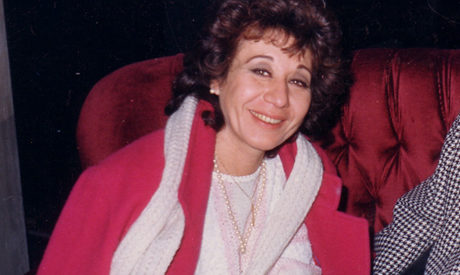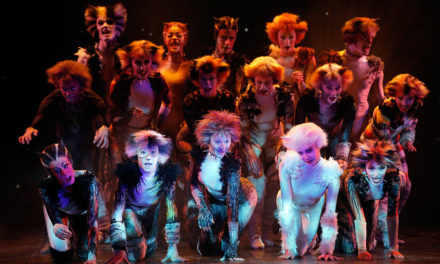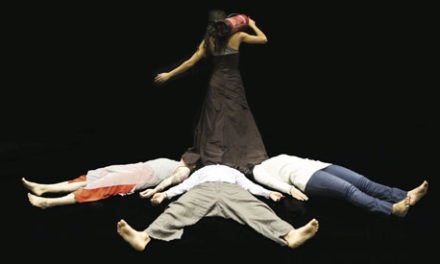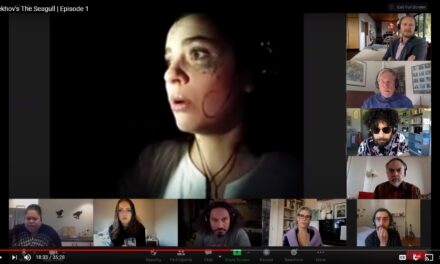On January 6th, the Egyptian culture scene lost one its highest pillars, Nehad Selaiha, a woman who holds a unique place in the world of theatre and among generations of theatre practitioners. Her presence was so strong no one really thought about her being among the primary colors of the artistic landscape until her departure left the picture skewed – and so it will remain for a long time.
A bilingual scholar, translator, historian, writer, and critic – her English reviews of Arab productions gave pages of Al-Ahram Weekly an indispensable depth and value for years on end – Selaiha had boundless energy and depth. Her multidisciplinary approach to theatre is demonstrated in dozens of books she authored or contributed to, hundreds of articles she wrote and as many prestigious seminars and juries she led or participated in.
But beyond her numerous awards and accolades, Selaiha was above all, a theatre aficionado, a promoter, mediator, and mentor who discovered, encouraged, and supported hundreds of young theatre-makers. A true “theatre activist,” as she was widely known, Selaiha saw the theatre as a kernel for creative energy, freedom of expression, and human development.
For decades we could always find Selaiha wherever theatrical practice took place: enjoying the comfortable seats of a well-equipped hall or barely balanced on a wooden chair in the corner of some simply lit fringe venue. Selaiha never minded sitting on the floor, surrounded by young followers and genuinely happy that a given space was full. Minor events were as important to her as large festivals, and big city lights captivated her with the same strength as the dark alleyways of provincial towns.
Selaiha attended every stage of the creative process: performances, rehearsals, readings, discussions of scenography and lighting. She observed, listened, and proffered her advice; and how inspiring she was when she spoke of the theatre’s magic, often with actors and directors. During performances, her laughter occasionally broke the silence of the auditorium, her enthusiastic applause was received with an almost juvenile pride by scores of young theatre makers, all of whom she treated as her own children. Then we would await her review, yet another experience in which the production became the nucleus of a much broader historical, social, political, philosophical, and human discourse.
When Selaiha wrote about theatre it was as if she was creating profound and lucid paintings; she was, in fact, telling stories about life. Indeed, for Selaiha, theatre was the life she shared with everyone around her, as she navigated with ease the network of passion, academia, people, and complicated hierarchical structures. And it was thanks to her omnipresence and boundless dynamism that she could keep watching new generations take the stage, but time never stood still and the effort – the many difficulties and disappointments, too – began taking their toll on her health.
Stage as passion
Born in 1945, at a tender age Selaiha wanted to become a theatre actress.
“It was through Shakespeare that I had my first lesson in theatre when I played Shylock, then Rosalind in secondary school. When later, at university, I played Desdemona and Hermia, my lifelong bond with theatre was sealed,” Selaiha writes in her essay “Reconstructing the ‘Local’: A Personal Perspective,” part of a book entitled The Local Meets the Global in Performance, edited by Melissa Sihra.
Selaiha went on to study English literature at Cairo University, obtaining her MA from the University of Sussex, UK, in 1969, but she stayed close to theatrical circles partly through her fiancé (and later her husband) Mohamed Enani, who at the time co-edited Theatre magazine; Enani was to become not only the renowned translator of Shakespeare, Byron, and Pinter to Arabic but also a major scholar, writer, and critic who translated Arabic literature to English as well.
The arts and humanities at large became Selaiha’s life, feeding her passion for theatre all the more: she became a regular at the Music Library where Jean Sibelius’ “Symphony no. 1” made a strong impression on her. On the other hand, she would remain intellectually indebted to philosophers such as Sartre, Camus, and Kierkegaard; Nietzsche in particular, spoke to her, making her “separate ethics and metaphysics,” as she put it.
In the mid-1970s, Selaiha returned to Shakespeare, briefly teaching Shakespearean drama at King Abdulaziz University in Jeddah, Saudi Arabia, but by the late 1970s she was already teaching criticism and drama at the High Institute for Art Criticism – the position through which many of us first became aware of her – moving in and out of Egypt while she earned her PhD in drama from the University of Exeter, UK, in 1982. Finally settling in Egypt in 1984, she was offered tenure at the institute, of which she became dean in 2001-2003.
“Being on stage remained a passion with me throughout my life although I couldn’t become an actress, and so teaching offered me a sort of a substitute,” Selaiha revealed in a 2013 interview for Ahram Online: “I enjoy teaching because, for me, it’s like being on stage, I have the floor, I teach drama, I can act all the parts I like… I have a captive audience.” And indeed Selaiha took her role as educator to a highly theatrical level – in the best sense.
“There was everything but routine in Nehad’s lectures,” Maissa Zaki, a theatre critic and practitioner and one of Selaiha’s many students-turned-friends, recalls the time she spent in her class.
“Not only did she teach us, she also created an interaction, she performed the roles, invited us to respond to them, triggered our minds, raising questions and, together with us, searched for the answers. She had this unique theatrical energy which channeled into her classes; and what a great actress she was.” Zaki adds that Selaiha used to call her a “kinder soul,” thanks to the very close friendship they developed through the years. “She was my only teacher and this was my choice. Those were the most beautiful days of my life. She showed us the theatre, becoming our friend and mother.”
Alongside her teaching, Selaiha had already been sharing her knowledge even more broadly, writing about theatre in Arabic in Theatre magazine and, once it became available, in English in Al-Ahram Weekly, but also elsewhere throughout the world. Her passion was contagious. She generated interest and won the hearts of the young since, though she was interested in all forms of theatrical expression, she had a strong belief in independent troupes, which to her were the platform for truly free creative expression and boundless experimentation.
In 1990, when the dynamics of an independent theatre changed, she was a main character in the drama. In her comprehensive article “25 years of independence,” published in Al-Ahram Weekly’s issue of April 14th, 2016, she wraps up that moment: “On August 23, 1990, a group of theatre artists, critics, and activists met at the Acting Professions Union in downtown Cairo to protest the decision of the Ministry of Culture to cancel that year’s edition of the Cairo Experimental Theatre Festival due in September on account of the Iraqi invasion of Kuwait. In this historic meeting the idea of the independent theatre movement as a ‘third way’ (to borrow Eugenio Barba’s phrase), or alternative to both the state and commercial theatres was born.
“Initially, all that was hoped for was to create a pressure group to persuade the Ministry to allow a non-governmental national theatre festival to go ahead if an international governmental one was deemed politically embarrassing. The discussion however soon slithered from practical considerations of the proposed event to the politics of theatre itself. The meeting had attracted groups from the Fringe – young and ardent self-supporting offshoots of the university and regional theatres who faced many obstacles and constraints and lacked official recognition and legal status.”
The historical event, as Selaiha explains, led to the First Free Theatre Encounter [aka. Festival] in 1990, followed by the second Free Theatre Festival at the Al-Taliaa state theatre, in 1991, and eventually a strong independent movement housed by the newly opened Al-Hanager Arts Centre that has been gaining momentum ever since. Selaiha’s article opens as a mere report of the facts, through which she underlines important milestones reached by the independent pioneers. With typical humility, she refrains from mentioning her own crucial role in helping to unify many dispersed voices into a theatrical movement. It was the kind of thing that she did expect nothing in return – her mission, which she was never to give up for one day till the end of her life.
Godmother of Egypt’s many independent theatre-makers
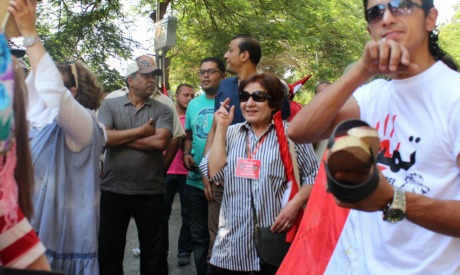
Nehad Selaiha among Egyptian artists and intellectuals during protests in 2013 (Photo: Ati Metwaly)
“In 1988, Dr. Nehad attended a performance I directed with student colleagues at Cairo University,” director Tarek Said recalls his earliest beginnings. “A few days later, to our great surprise, we found an article praising us, published in the Arabic press. Us, young students, not linked to any state theater, experimenting on stage, on the pages of a magazine! This was beyond any expectations or dreams. The rest was like a snowball; we found ourselves part of the bigger movement, surrounded by troupes coming from all across Cairo and the provinces. While Selaiha was the dynamo, she neither promoted her presence nor took credit for it.” Said explains how Selaiha set everything into motion.
He points out how, apart from the state productions on which she also ardently followed up, she would invest much time in attending, documenting, analyzing, and becoming a part of independent works and amateur theatrical experiments. She would talk to the actors and directors, discuss their dreams and connect them with each other. “I remember all the times when Dr. Nehad would call me and tell me – in fact, order me – to attend this or that performance or ask me to help this director or that actor. ‘How can you have theatre if you do not support one another?’ she used to say. She would do it with all of us, and we would always listen to her and follow her instructions.”
Selaiha’s involvement in the independent scene expanded as she became its best mediator. “Everyone, starting with our generation which entered theatre in the early 1990s, had his own special relationship with her,” the director, scenographer and playwright Mohamed Abul Soud explains, pointing to the many instances when Selaiha reviewed his plays, negotiated their staging with censorship authorities, and fought for other young creators. In many instances, what gave her strength was her well-established academic status and respect from her colleagues in state institutions and across many cultural venues.
With diplomacy she always managed to turn those assets to the benefit of independent theatre-makers. “It was very hard to say ‘no’ to Selaiha,” Hoda Wasfi, the director of Al-Hanager Arts Centre from its inception until 2012, revealed. “She always stood behind young people. I remember a few instances when for different reasons, I could not host a specific performance or I did not have a sufficient budget. Selaiha would come to my office with a series of arguments why we should give this play a chance and would come up with budget solutions. She always found her way to convince us,” Wasfi comments with warmth, adding how Selaiha would go to many locations, open the doors to creators, push them to work, develop, and remain strong as a collective creative force.
“She invested a lot in our development,” Said says; “she was behind many interactions with international theatre-makers. She never wanted any credit for it, never even mentioned it…Often young people were not aware that when they attended a workshop, participated in an exchange, or worked in a new space, Selaiha was the one who made that possible. She sculpted us, believing all along in the power of the theatre movement at large.”
No wonder so many theatre practitioners think of Selaiha as their irreplaceable godmother. Writer, performer, choreographer and theatre director Nora Amin cherishes her special relationship with her, saying that “the word ‘mentor’ was specially created for Nehad Selaiha. She had the special talent of mentoring and breeding a whole generation of artists and theatre-makers. This talent goes way beyond academic experience or scientific expertise, it is a talent of the heart that has a huge impact on the development of both the artistic and the human fields. What Nehad gave me was not only my birth certificate as a theatre director in 2000 with her historic review of my play but also her faith in change, it was a passion that extended over decades and provided cultural and societal recognition for more than one generation of independent theatre artists, and for whom she is truly considered a godmother, although she always preferred the role of a friend to that of a parental figure.”
And there were times when Selaiha’s unconditional support of young theatre-makers also raised eyebrows of more critical voices questioning her choices. Playwright Rasha Abd Elmonem, who was herself offered many motherly gifts and lessons from Selaiha, explains that “Selaiha believed that anyone who needs to express himself through theatre deserved her embrace. She told me once that ‘theatre is a big territory and there is a place for everyone. We only need to put everyone in the right place. Theatre has the power of reshaping minds and works beautifully with reformulating sense of aesthetics among amateurs. If we send anyone away, they might end up dropping the arts altogether or drifting to very dark areas.’ I will never forget this lesson.”
Another lesson Abd Elmonem received from Selaiha took place when, while she was part of a festival’s selection committee, Selaiha strongly opposed the entry of a play that was considered interesting material by other members. “I was puzzled again. And again Selaiha explained that though the topic is politically interesting, the artistic side needed a lot of improvement to support the content. ‘This play will be challenged by everyone for its thematic choices, and the creator doesn’t have arguments artistically strong enough to defend himself. He will end up giving up while we need his mind to stay on theatre! We have to help him develop artistic strengths rather than lead him to artistic suicide. It’s a different kind of responsibility.’”
And, whatever its kind, it is this strong sense of responsibility that Selaiha felt for the theatre movement that made her very different to all other academics and for which she has become a major pillar of what this scene is today. The dynamics that exist in Egypt’s independent theatre today, more than 25 years after “the historic meeting,” are but a continuation of a path already laid by the previous generations. Even if today’s theatrical expressions seem different to those of the past two decades, and they reflect different contexts and perceptions, they remain but the new – and fresh – branches of a creative tree, planted in the 1980s, and duly watered by Selaiha through the years.
A scholar who documented theatre history and embraced novelty
With her constantly young and fresh spirit, even in the last years of her life, Selaiha always welcomed novelty, change, and experimentation, new theatrical formats and vocabulary. She was happy to capture those novelties on many occasions, with an article she wrote in Al-Ahram Weekly on December 29th, 2011, titled “A Year of Revolutionary Theatre” being one such testimony.
In it, she walks us through the 12 months of “a rich crop of performances,” the productions of the mainstream (state) theater, the independent pieces that spoke of the martyrs, and Arab drama classics that were reworked to fit the moment. She highlights, however, “a powerful upsurge of a new branch of documentary theatre that has been absent from the Egyptian theatre scene – namely: verbatim theatre.”
She kept challenging decision makers through the years. She was the one to fight vigorously for the young as well as speaking for the whole scene. Selaiha was the main voice demanding the return and revamping of the Cairo International Festival for Experimental Theatre (CIFET) which had been suspended in 2011. Last year, in 2016, she was finally able to see that happen when CIFET returned as the Cairo International Festival for Contemporary and Experimental Theatre. As she watched and documented, just as before, she looked to the future with her hallmark optimism.
Perhaps what enabled her to go on was that she was, as Maissa Zaki says, a plethora of creative personalities. “She was one person during lectures, another one in official seminars. She knew how to address young theatre-makers as well as how to communicate within the official establishment. She was a powerful official, a serious academic, a young and rash theatre aficionado. In her writings, she had different colors for different readers, always surprising them and offering something new.”
Director Essam El-Sayed agrees that her reviews were “always down to earth – she analyzes and encourages, remains balanced and never overly emotional while she helps us understand our emotions. She has depth without needlessly complicating things. It is a very unique skill.” Even during the final weeks of her life, Selaiha continued attending performances, documenting the history of Egyptian theatre, analyzing trends and developments, setting them in larger contexts, and speaking about the vibrant multidisciplinary relations between the many phenomena. She taught us arts, culture, and life presented international theatrical practices to Egyptian readers and spoke about Egypt to an international scene.
As a theatre critic, to Al-Ahram Weekly readers, Selaiha offered hundreds of stories that varied from reviews to elaborate analyses of a theatrical movement. She could dedicate an entire article to a director, a playwright, or an actor, but she could also invite the reader on a journey that touched on the broader creative, societal, and historical aspects of a given work. At times she could even step beyond the known canons of theatre criticism, and open her article with a frustration triggered by the removal of a tree from the theatre’s courtyard, or describe the large staircase she had to conquer when visiting the offices of Fawzy Fahmy, CIFET’s former president. For Selaiha, even those seemingly trivial and unrelated components were part of her life in the theatre.
Throughout her academic career, she continued creating vibrant links between her passion, Egyptian theatre and the international scene, for which she received numerous awards and recognitions handed to her at many local, regional and international theatre festivals including the Sharjah Festival, the Gulf Cooperation Council Festival, the Carthage Festival, the Amman International Theatre Festival, and the Doha Arab Theatre Festival in 2012. In November last year, she received the prestigious award in the field of arts and literature from the Kuwait Foundation for the Advancement of Sciences.
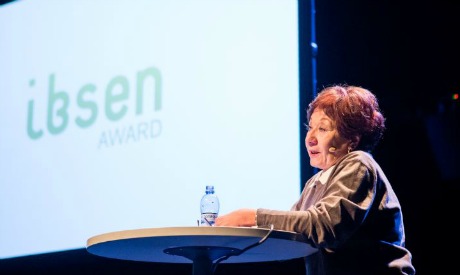
Nehad Selaiha during the Skien International Ibsen Conference, Norway, in 2013 (Photo: Skien International Ibsen Conference)
In Egypt, Selaiha received recognition from the Cairo International Experimental Theatre Festival (1996), the State Award for Superior Achievement in Literary Studies (2003), and the State Appreciation Award for Arts (2013). Many publications wrote about Selaiha, while the January 2nd, 2017 edition of Masrahna (Our Theatre) magazine dedicated its issue to her. Her contribution to the cultural field had, after all, been extended through her membership of the High Committee for the Theatre at the Supreme Council of Culture, and at the Drama Committee of the Production Department for Radio and Television. She was also at the board of directors at the Roberto Cimetta Fund to Support Young Theater Artists in the Euro-Med Region.
But all this is but a tiny part of the story, for much of what Selaiha achieved in her life cannot be quantified. Not one person who crossed her path was unaffected by her unique spirit, wisdom, or genuine passion to support and encourage.
We all mourn the loss of a great scholar, critic, and a mentor. While the void is irreplaceable, we are also left with the many gifts Selaiha bestowed upon us. Her writing will remain with us, but more importantly, her presence will live on in our hearts – thousands of godchildren.
This post was written by the author in their personal capacity.The opinions expressed in this article are the author’s own and do not reflect the view of The Theatre Times, their staff or collaborators.
This post was written by Ati Metwaly.
The views expressed here belong to the author and do not necessarily reflect our views and opinions.

